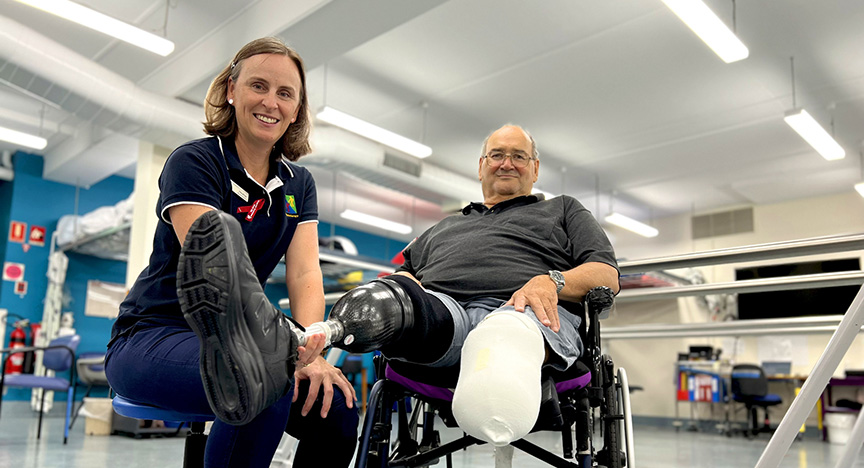
Princess Alexandra Hospital amputee physiotherapist of more than 20 years, Heather Batten has brought her learnings from rehabilitation units across eight countries in Europe and England back to PAH to improve the lives of Queenslanders with an amputation.
Heather was awarded a Churchill Fellowship in 2020 and has visited 14 rehabilitation facilities, in Denmark, England, Germany, Ireland, Netherlands, Norway, Scotland, and Sweden to observe different amputee rehabilitation models of care to understand how they support the transition process for patients, discharging from hospital to home.
“I visited public and privately funded facilities, and hospital and community programs, and I even participated in a Pilates class with Danish Wounded Warriors.”
She said that facilities all had varying staff-to-patient ratios which really highlighted where some clinicians were able to spend more time with their patients to individualise rehabilitation programs so they can achieve their goals.
“On my travels I observed state of the art amputee rehabilitation facilities and saw the benefits of incredible equipment such as; virtual reality treadmills, adjustable depth hydrotherapy pools, rock climbing walls, wheelchair treadmills, immersive cycling devices, smart balance machines and outdoor mobility areas which all can benefit people enormously in their recovery and rehabilitation.
“In Australia, we still have a significant barrier between health and community services, including the complexities between NDIS, health and community. Some countries, like Sweden, have an integrated system, where funding and health records are all linked, which provides much more coordinated care for patients,” she said.
“While I didn’t find any place that was the “holy grail” of amputee rehabilitation, each place I visited overseas had novel ideas that Australia can learn from and incorporate into our rehabilitation programs. Some health facilities co-share gymnasiums with the local community where the hospital uses the space during the day, and community sport uses it at night. This is a great use of resources and mixes people in the hospital with people in the community.”
She said that limited programs exist in Australia to help patients adjust to living back at home and adapt to life with an amputation.
“In Queensland, there is a specialised transition program for people with a spinal cord or brain injury after they leave hospital. My goal is to develop a specialised transition program for people with amputation.”
Peter Bacon (71) from Beaudesert on the Scenic Rim is a double below-knee amputee who is a current inpatient at PA Hospital and has directly benefited from Heather’s wealth of physiotherapy experience both before, and now after her Churchill Fellowship.
“Heather was my main physio when I was first here and she really knew what she was doing. I felt comfortable and she seemed to know how far to push my rehabilitation,” he said. “Each day is about doing a bit extra, and you set a goal for yourself. It’s good to have something to aim for by end of the week.”
Peter was cast for his new limb this week – a true celebration of amputee awareness week - which Heather says will help him continue his independence back in the community.
“People with lower limb amputation need to have better support when they leave the hospital and adjust to their new lives as they face many barriers, such as the physical environment, social support and prosthetic function.”
Heather who hopes her shared findings with clinicians, researchers, and consumer groups reduce known barriers to services in the community and home space.
Listen to Heather's radio interviews here: